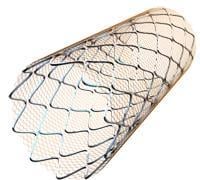
November 1, 2012 — InspireMD Inc. announced that its proprietary MGuard embolic protection stent (EPS) was shown to be significantly superior when compared to standard bare metal and drug-eluting stents in achieving complete ST resolution and restoring normal blood flow in a major study of 432 randomized patients undergoing emergency coronary intervention for potentially fatal heart attacks.
The data was reported at the 24th annual Transcatheter Cardiovascular Therapeutics (TCT) scientific meeting by Gregg W. Stone, M.D., the study's chairman and the director of the Cardiovascular Research and Education Center for Interventional Vascular Therapy at New York-Presbyterian Hospital/Columbia University Medical Center.
The findings show the MGuard EPS provides a significant acute advantage and, as a result, may hold the potential to lower the incidence of adverse sequela and prolong survival of heart attack victims. The study met its primary endpoint (proportion of patients with ST segment resolution of ?70 percent, measured at 60 to 90 minutes post procedure), showing the MGuard EPS was significantly superior to the control arm of bare metal and drug-eluting stents in the treatment of heart attack patients. Other findings showed:
- Significantly more patients treated with the MGuard EPS achieved complete ST resolution (a measure of blood flow restoration to the heart muscle) compared to control arm (57.8% vs. 44.7%, P=0.008), a relative improvement of 29 percent.
- When compared to control, the MGuard EPS showed a significant improvement in coronary artery blood flow, including: 1.) superior rates of restoring normal blood flow (TIMI-3 flow) (91.7% vs. 82.9%, P=0.006, a relative improvement of 10.6%); and 2.) significantly less incomplete blood flow (TIMI-0/1 flow) post-percutaneous coronary intervention (PCI) (1.8% vs. 5.6%, P=0.01, a relative improvement of 67.9%).
- The trial showed a trend toward lower mortality (0% vs. 1.9%, P=0.06) at 30 days and smaller infarct size as measured by post procedure cardiac magnetic resonance imaging (MRI) (17.1gr vs. 22.3gr, p=0.27) in the MGuard EPS arm versus control.
- There was no difference between the groups in the secondary endpoint of myocardial blush grade (MBG), which is an angiographic measure of blood flow to the cardiac muscle (MBG2/3 83.9% vs. 84.7%, P=0.81).
"I was impressed with the performance of the MGuard embolic protection stent in the MASTER trial," said Stone. "Compared to standard stents, the MGuard is the first stent in a randomized trial shown to restore complete ST-segment resolution in a higher proportion of patients, a key predictor of myocardial salvage and long-term survival in STEMI (ST-segment elevation myocardial infarction) patients."
The MGuard EPS is integrated with a precisely engineered micro net mesh that prevents the unstable arterial plaque and thrombus (clots) that caused the heart attack blockage from breaking off.
The MASTER (MGuard for Acute ST Elevation Reperfusion) trial randomized 432 patients to MGuard EPS (217) and to either bare metal or drug-eluting stents (216). Fifty centers in nine countries participated in the trial. Patients are being followed for one year. Details of the MASTER trial were published online in the Journal of American College of Cardiology (JACC).
The authors concluded that "among patients with acute STEMI undergoing emergent PCI enrolled in the present multicenter, randomized, controlled trial, the MGuard EPS micro-net-covered stent compared to standard metallic stents resulted in superior rates of epicardial coronary flow and complete STR, with trends present toward reduced microvascular obstruction, infarct size and mortality."
For more information: www.crf.org


 January 05, 2026
January 05, 2026 









